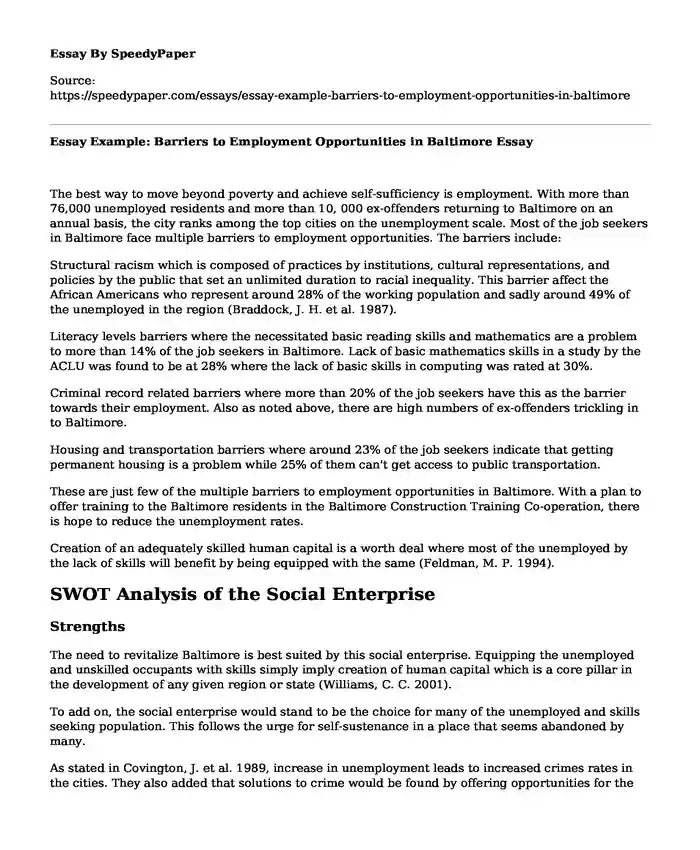
| Type of paper: | Business plan |
| Categories: | Employment Social work |
| Pages: | 3 |
| Wordcount: | 743 words |
The best way to move beyond poverty and achieve self-sufficiency is employment. With more than 76,000 unemployed residents and more than 10, 000 ex-offenders returning to Baltimore on an annual basis, the city ranks among the top cities on the unemployment scale. Most of the job seekers in Baltimore face multiple barriers to employment opportunities. The barriers include:
Structural racism which is composed of practices by institutions, cultural representations, and policies by the public that set an unlimited duration to racial inequality. This barrier affect the African Americans who represent around 28% of the working population and sadly around 49% of the unemployed in the region (Braddock, J. H. et al. 1987).
Literacy levels barriers where the necessitated basic reading skills and mathematics are a problem to more than 14% of the job seekers in Baltimore. Lack of basic mathematics skills in a study by the ACLU was found to be at 28% where the lack of basic skills in computing was rated at 30%.
Criminal record related barriers where more than 20% of the job seekers have this as the barrier towards their employment. Also as noted above, there are high numbers of ex-offenders trickling in to Baltimore.
Housing and transportation barriers where around 23% of the job seekers indicate that getting permanent housing is a problem while 25% of them can't get access to public transportation.
These are just few of the multiple barriers to employment opportunities in Baltimore. With a plan to offer training to the Baltimore residents in the Baltimore Construction Training Co-operation, there is hope to reduce the unemployment rates.
Creation of an adequately skilled human capital is a worth deal where most of the unemployed by the lack of skills will benefit by being equipped with the same (Feldman, M. P. 1994).
SWOT Analysis of the Social Enterprise
Strengths
The need to revitalize Baltimore is best suited by this social enterprise. Equipping the unemployed and unskilled occupants with skills simply imply creation of human capital which is a core pillar in the development of any given region or state (Williams, C. C. 2001).
To add on, the social enterprise would stand to be the choice for many of the unemployed and skills seeking population. This follows the urge for self-sustenance in a place that seems abandoned by many.
As stated in Covington, J. et al. 1989, increase in unemployment leads to increased crimes rates in the cities. They also added that solutions to crime would be found by offering opportunities for the unemployed especially the youths. Finding Baltimore at its worse condition of increased crime rates due to high unemployment rates, this social enterprise will offer an alternative solution to the unemployed in the city, a factor that will aid in the revitalization of the city.
In addition, the social enterprise has the ability of absorbing the 21% of the unemployed and job seeking population in Baltimore, a percentage that is made of ex-offenders who have a hard time in job seeking (Covington, J. et al. 1989).
One of the major goals of a country, state or city is to find grow economically at reasonable rates. The social enterprise through the reforming, retraining and employing ex-offenders and other unemployed beings in Baltimore, would definitely brand the enterprise as one of the pillars to the stabilization of Baltimore's economy
To sum up the strengths, the unique selling proposition or idea of the social enterprise is that it would lead to equipment of skills and creation of employment for the ex-offenders as well as yearning unemployed population.
In addition, the social enterprise's value proposition would be the reduction of unemployment amongst the Baltimore population. This would automatically lead to the raising of living standards of the occupants of the city as well as the reduction of crime rates. All these factors would lead to revitalize and rejuvenate the Baltimore as well as transforming the narrative about the city's unemployment rates and ex-offenders population.
References
Braddock, J. H., & McPartland, J. M. (1987). How minorities continue to be excluded from equal employment opportunities: Research on labor market and institutional barriers. Journal of Social Issues, 43(1), 5-39.
Feldman, M. P. (1994). The university and economic development: the case of Johns Hopkins University and Baltimore. Economic Development Quarterly, 8(1), 67-76.
Covington, J., & Taylor, R. B. (1989). Gentrification and crime: Robbery and larceny changes in appreciating Baltimore neighborhoods during the 1970s. Urban Affairs Quarterly, 25(1), 142-172.
Williams, C. C. (2001). Tackling the participation of the unemployed in paid informal work: a critical evaluation of the deterrence approach. Environment and Planning C: Government and Policy, 19(5), 729-749.
Cite this page
Essay Example: Barriers to Employment Opportunities in Baltimore. (2022, May 03). Retrieved from https://speedypaper.net/essays/essay-example-barriers-to-employment-opportunities-in-baltimore
Request Removal
If you are the original author of this essay and no longer wish to have it published on the SpeedyPaper website, please click below to request its removal:
- Free Essay on the UN Guidelines on Green House Gas Emission
- Free Essay Sample on Environmental Campaign
- Essay Example on Globalization and Cultural Change
- Essay Example on Designing the Perfect Personal Identity
- Paper Example: A Grant Proposal for a Compost Program
- United Nations Security Council, Free Essay Example
- Paper Example on What Makes CEOs Successful
Popular categories




